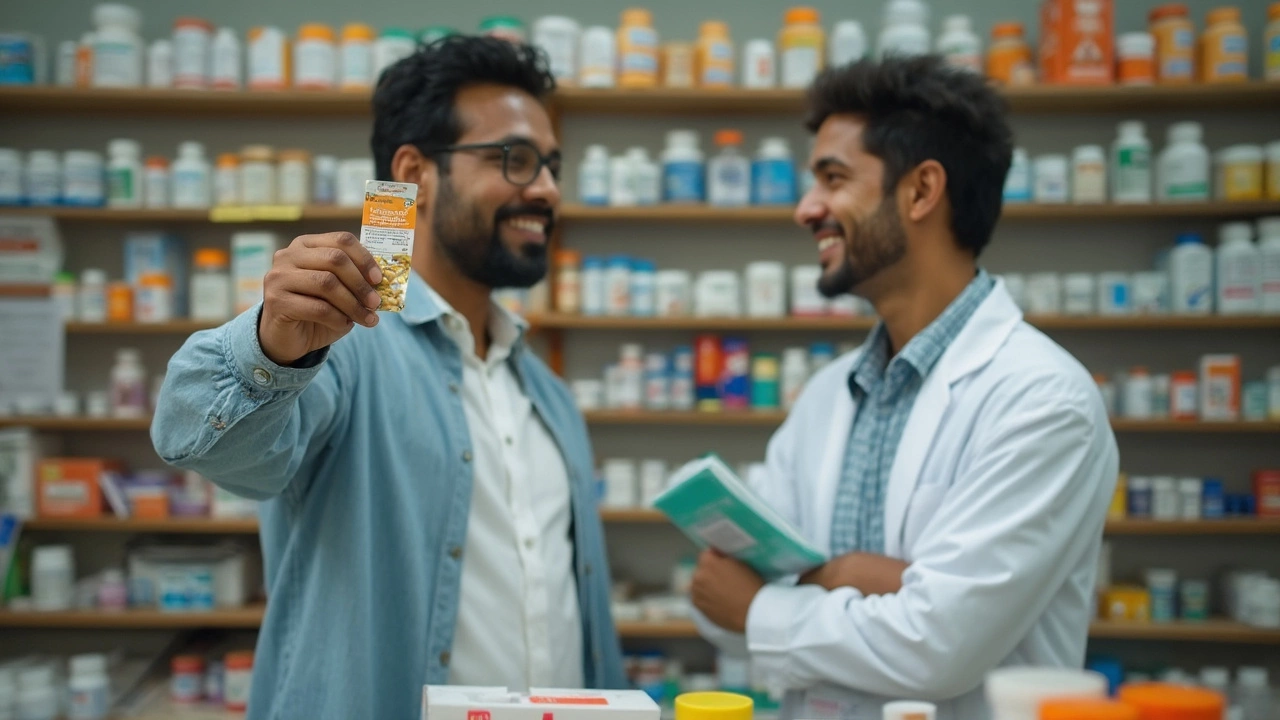Ever thought simple cough syrup could mess with your blood sugar? For people with diabetes, it’s not just about skipping sugar in their coffee. Medications—even those you grab at the pharmacy without a second thought—can flip your blood sugar one way or the other.
Some pain relievers, steroids, and even allergy meds quietly push glucose up. Then, you’ve got herbal supplements that seem healthy but actually clash with diabetes drugs. There’s an entire list of surprise pitfalls out there, and dodging them can mean the difference between a good day and an emergency.
If you’ve ever wondered whether you need to read the ingredients list on that pink cough syrup, here’s the hard truth: you do. The stuff hidden in those bottles and tablets can undo hours of careful blood sugar control. But don’t worry—knowing what’s forbidden can help you steer clear of nasty surprises.
- Surprising Medicines That Raise Blood Sugar
- Secret Dangers in Common Painkillers
- Hidden Sugar Traps in Cough Syrups and Supplements
- Why Herbal Remedies Aren’t Always Safe
- Smart Strategies to Stay Safe with Medication
Surprising Medicines That Raise Blood Sugar
Most folks know to avoid candy and soda, but did you know some prescription or over-the-counter drugs quietly mess with your blood sugar? It can catch you off guard, especially if you’re careful with food but not thinking about what’s in your medicine cabinet. Here’s where things get tricky—several everyday medicines can push sugar levels up, making diabetes harder to manage.
Steroids like prednisone are at the top of the trouble list. They’re used for asthma, allergies, and even joint pain. The big problem: steroids can spike blood sugar fast, even after just a few doses. Doctors have seen people’s numbers double in just a week on steroids.
Certain types of birth control pills and hormone medicines can also raise blood sugar, thanks to the way extra estrogen messes with insulin. It’s not just women—men on testosterone therapy might have the same problem.
Some folks reach for decongestants and cold medicines without thinking twice. But decongestants with pseudoephedrine or phenylephrine make your liver release more sugar into the blood. Even those innocent-looking allergy pills might have a small effect.
Antipsychotics and antidepressants are another sneaky cause. Drugs like olanzapine (Zyprexa) and quetiapine (Seroquel) can send sugar way up—and this is well-documented. Some studies have found regular users have a 30% higher risk of developing high blood sugar.
Here’s a handy table to show which common meds are risky if you’re managing diabetes:
| Medicine Type | Common Examples | Potential Effect on Blood Sugar |
|---|---|---|
| Steroids | Prednisone, Hydrocortisone | Rapidly raises sugar levels |
| Decongestants | Pseudoephedrine, Phenylephrine | Raises blood sugar |
| Antipsychotics | Olanzapine, Quetiapine | Increases blood sugar, raises diabetes risk |
| Hormone Therapy | Birth control pills, Testosterone | Can disrupt insulin, cause spikes |
| Certain Antibiotics | Levofloxacin | Rare, but can raise or lower sugar |
So, if you’re prescribed something new, or pick up cold medicine, always ask your pharmacist, "Does this mess with my blood sugar?" It’s way easier to swap for something safer before your glucose goes on a wild ride. Keeping a list of your meds handy helps your doctor spot these sneaky troublemakers too. And don’t just look for sugars on food labels—medications can hide sugar too, so always check the inactive ingredients.
Bottom line: knowing which medicines are forbidden for diabetics saves you a lot of stress and fewer surprises when you check your readings.
Secret Dangers in Common Painkillers
Most folks think over-the-counter painkillers are harmless. But for anyone managing diabetes, these pills can spell trouble—even the ones you’d never expect. Some of these drugs don’t just mess with pain; they secretly tweak your blood sugar, sometimes sending it way higher or lower than you’d want.
Let’s break down what’s risky. Nonsteroidal anti-inflammatory drugs (NSAIDs) like ibuprofen and naproxen are everywhere, but if you take them daily, they can sometimes make your kidneys work harder. This is especially risky if your blood sugar has already put stress on your kidneys. Plus, NSAIDs may trigger water retention or raise blood pressure, two things people with diabetes don’t need.
Acetaminophen (Tylenol) is usually safer for kidneys, but here’s the sneaky part: it can mess up continuous glucose monitor (CGM) readings, making your device tell lies about your actual blood sugar.
- Ibuprofen and naproxen: Can stress kidneys, may raise blood pressure.
- Aspirin: In large doses, can lower blood sugar too much—this can be dangerous if you’re on insulin or sulfonylureas.
- Acetaminophen: Might interfere with CGM devices, showing fake high glucose numbers.
And don’t even get started on opioid painkillers. They not only cause constipation and brain fog, but they can cloud symptoms of low blood sugar, making it tough to know when you’re crashing.
| Painkiller | Effect on Diabetics | Extra Risk |
|---|---|---|
| Ibuprofen/Naproxen | Raises blood pressure, kidney stress | Chronic kidney disease risk |
| Acetaminophen | CGM reading errors | Can mask real blood sugar changes |
| Aspirin (high dose) | Can push blood sugar too low | Hypoglycemia if used with certain drugs |
Always check the fine print or ask your doctor before grabbing a painkiller, especially if you use a diabetes medication or have concerns about your kidneys or heart. There’s no shame in asking—sometimes the stuff that seems safe is the very thing that can mess you up.

Hidden Sugar Traps in Cough Syrups and Supplements
Grab a bottle of cough syrup, and chances are there’s more sugar in there than you’d expect. Many over-the-counter syrups are loaded with glucose, fructose, or even honey to make them taste better. For people with diabetes, that's a fast way to send blood sugar soaring—sometimes by 30 to 50 mg/dL just from a normal dose over a day.
But it’s not just cold medicines. Multivitamins, antacids, and ‘chewable’ tablets are sometimes sweetened, too. Diet supplements that seem innocent can also come packed with hidden carbs, especially gummy versions or effervescent tablets. This hidden sugar kicks in fast, messing up your reading even if you’ve managed everything else perfectly.
- Always check the label for words like dextrose, high-fructose corn syrup, sucrose, or honey.
- Look for 'sugar-free' or 'for diabetics' versions, but still scan for alternative sweeteners that might affect you.
- If you see ‘flavored’ or ‘chewable,’ dig deeper—these often use sugars for taste.
Check this out—according to a 2022 survey by the American Diabetes Association, nearly 40% of popular over-the-counter cold remedies had more than 3 grams of sugar per regular dose. That’s about as much as a small sugar cube, but nobody thinks of medicine as a sugar source.
| Product Type | Average Sugar Per Dose |
|---|---|
| Cough Syrup (Regular) | 3–5g |
| Cough Syrup (Sugar-Free) | <1g |
| Chewable Multivitamins | 2–4g |
| Effervescent Vitamin C | 1–3g |
If you’re already on strong diabetes medication, a few grams here and there can easily throw off your routine and make sugar swings harder to manage. Instead, ask your pharmacist for sweetener-free or low-carb options. These are often shelved right next to the sugary stuff but aren’t always the obvious pick.
Last tip—log everything. When you take any new supplement or medicine, make a quick note if you notice a spike in your readings within the next few hours. It sounds simple, but it’s the best self-defense for catching sneaky sugar traps before they snowball into real problems.
Why Herbal Remedies Aren’t Always Safe
Herbal remedies sound harmless, right? They’re sold everywhere, seem “natural,” and friends might swear they help control their diabetes. Here’s the catch: many aren’t as safe as they look—especially when you’re already taking diabetes medication.
Some herbs, like ginseng and bitter melon, can lower blood sugar on their own. Mixed with prescribed drugs, this can make your sugar drop too low—a situation that can get real serious, real fast. Other popular supplements, such as St. John’s Wort, mess with how your body breaks down meds, meaning your diabetes pills may not even work as they should.
Don’t forget about aloe vera juice, fenugreek, or cinnamon supplements. These might push insulin or other diabetes drugs over the edge, making your blood sugar unpredictable. There’s no magic potion when it comes to diabetes.
- Always check with your doctor before adding any herbal supplement.
- Look out for overlapping effects; if both the herb and your medication lower blood sugar, you’re at risk for dangerous lows.
- Skip anything that claims it “replaces” your prescription—there’s no legit proof behind those promises.
Labels won’t warn you about interactions. Even online forums can be full of half-truths. Trust your doctor or your pharmacist—they know how herbs and drugs mix in ways a product label just won’t say. Play it safe, and you’ll avoid some nasty surprises.

Smart Strategies to Stay Safe with Medication
If you’re dealing with diabetes, playing it smart with your meds is non-negotiable. The stuff doctors warn you about isn’t just for the textbook—mistakes with medication put people in the ER every single day. Here’s what really works for keeping things under control.
- Always read the labels—look for hidden sugars (like in cough syrups) and check for warnings about diabetes or blood sugar.
- Keep a running list of every medication, supplement, and vitamin you take. Update it when something changes, and bring it with you to appointments.
- Double-check drug interactions. Some over-the-counter meds, like non-steroidal anti-inflammatories (think ibuprofen), might mess with kidney function or blood pressure, especially if you’re already taking diabetes pills.
- Don’t mix up medication times. Insulin, for example, isn’t as forgiving as that daily multivitamin—take it late or after eating the wrong food, and your numbers go haywire.
- Ask your pharmacist about sugar-free alternatives. They’ve seen it all and probably have a safer option behind the counter.
A standout tip: use a pill sorter or app with reminders—missing doses happens more than people admit, even when prescriptions are filled on time. For older adults with diabetes, a recent study found up to 30% missed at least one dose per month. That adds up.
| Common Risk | What To Do |
|---|---|
| Unknown drug interactions | Check with your doctor or pharmacist every time you add a new med |
| Hidden sugars in OTC meds | Choose sugar-free or diabetic-friendly versions |
| Missing doses | Set reminders or use a pill box |
| Mixing up insulin timings | Stick to a routine—same time, every day |
| Not updating medication list | Carry an up-to-date list to all appointments |
If you want to keep your blood sugar numbers steady, it’s not only about diet and exercise—it’s about treating your medicine cabinet like a toolkit, not a junk drawer. Making these habits part of your daily life means fewer surprises and more predictable days.
